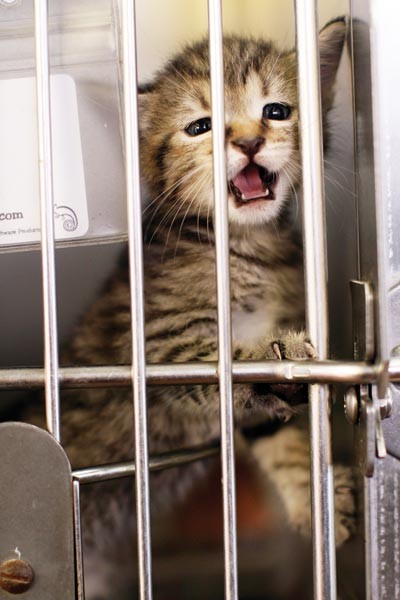Memphis Animal Services director James Rogers announced the lowest December euthanasia rate the shelter has experienced in years at the quarterly public meeting of the Memphis Animal Services Advisory Board meeting on Wednesday night.
There was a 59 percent kill rate for December 2012, up from percentages in the 70s and 80s over the past several years. In all of 2012, 8,859 animals were euthanized at the shelter versus numbers in the 11,000s in 2011 and 2010 and more than 13,000 animals in 2009.
Rodgers told meeting attendees about a new trap/neuter/release program for stray cats that is being run out of the shelter. Project Community Cat was launched in October with funding from the Society for Prevention of Cruelty to Animals. Since its launch, 88 feral cats have been spayed or neutered and released back into the city.
Rodgers said he was dedicated to improving staffing levels per shift. He said he’d hired a groomer and a new shelter supervisor.
But despite showing some improvements, board members and members of the public pointed out areas in need of work. Dr. Stephen Tower, the board chair, mentioned that, since GPS had been installed in animal control officers’ vehicles several months ago, the data was showing “a lot of room for improvement.” There was some talk of having animal control dispatchers be retrained by the people who train county 911 dispatchers.
Board member Jeanne Chancellor said the shelter clinic needed to get up to speed. The vet clinic in the new animal shelter building is equipped with five spay and neuter tables that aren’t all being utilized, and the X-ray machine does not work. Suggestions were made to have the city attorney’s office look into problems with the X-Ray machine, and Chancellor suggested the shelter do a better job of getting out into the community and offering spay and neuter services. The spay and neuter area of the clinic was originally intended to be open-to-the-public for spay and neuter services.
Cindy Sanders, a shelter reform advocate who observes weekly court proceedings for those charged with animal cruelty and other animal-related violations, suggested the shelter should look into getting some use out of those spay and neuter tables by altering the animals of those charged with violation of the city’s spay and neuter ordinance. Sanders and fellow reform advocate Jackie Johns have been raising money to have those pets spayed and neutered for some time, but they have been working with the local humane society for that service.
Chancellor also asked Rodgers to rethink a shelter policy that prevents vets from performing spay and neuter surgeries on heartworm positive dogs. Currently, pet owners must pay an extra $200 fee to re-claim their pet from the shelter if it is heartworm positive and unaltered. That fee, Chancellor said, prevents some people from being able to get their pets back. The procedure is riskier for heartworm positive dogs, and the decision not to alter heartworm positive dogs at the shelter began after a Rottweiler with heartworms died during the procedure. Rodgers said he would look into the possibility of making that change.
